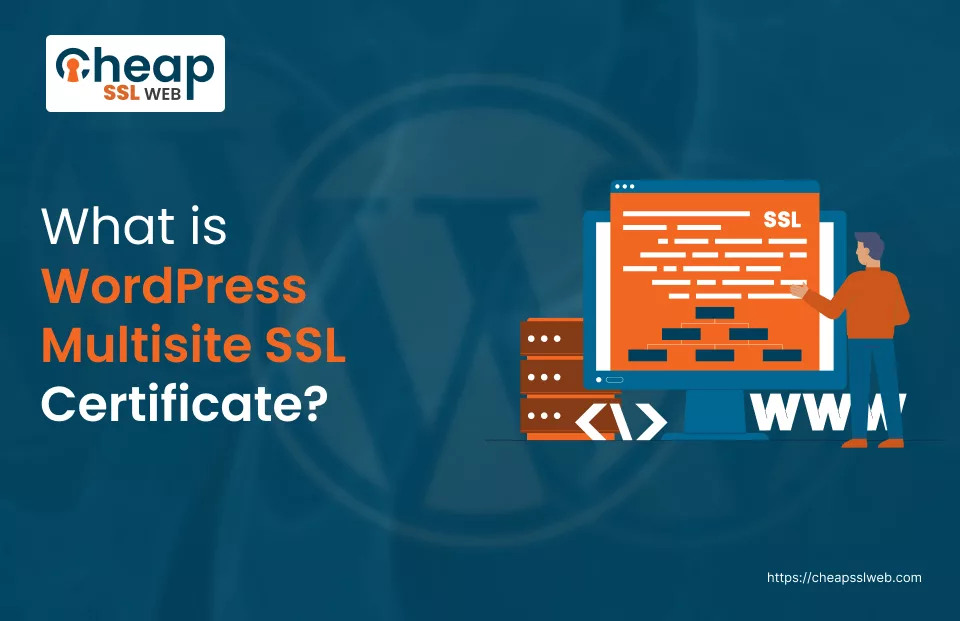What is WordPress Multisite SSL Certificate? Everything to Know About

What is WordPress Multisite SSL Certificate?
A WordPress Multisite SSL certificate is a type of an SSL certificate designed with a particular focus on a network of related sites on one WordPress Multisite installation.
Recommended: What is WordPress SSL? Troubleshooting the Common WordPress SSL Errors
WordPress Multisite is a specific feature of WordPress that allows you to create a web of multiple websites on one WordPress Multisite installation. Each within the network site may have its own domain or subdomain.
We recommend the usage of an SSL (Secure Sockets Layer) certificate, which provides encryption for the data that is sent between a user’s browser and the website’s server. In such a way, the sensitive information, such as login credentials, payment details, and personal data, remains secure.
Therefore, WordPress Multisite SSL certificate is to be used. In other words, every site in the network will be accompanied with a SSL certificate so that users can use HTTPS protocol to assess the sites securely.
Securing a WordPress Multisite installation with SSL certification is a must as simple as that, particularly if the network has some sites that involve sensitive data or undertake e-commerce activities.
It securely stores data with the help of data protections function and this aspect also improves the search engine optimization rankings and that is what enhances the entire user experience in all respects by providing a secure connection.
Pros of Using WordPress Multisite SSL With Your Network
Enhanced Security:
SSL encryption enables secure transmission of data that users may input in your website forms, bringing down the security risk of a potential data breach or unauthorized access.
Trust and Credibility:
Displaying the padlock icon and HTTPS in the URL bar in a browser is a sign of trustworthiness which sends a message to the visitors that their information is safe and secure.
Improved SEO:
Google uses HTTPS as one of its ranking factors. As such, SSL verification might not only simplify the process of closing a sale but also improve your site’s search engine rankings and visibility.
Compliance:
Although SSL security is not always mandated it is frequently necessary to comply with data protection rules, such as GDPR (General Data Protection Regulation), and PCI DSS (Payment Card Industry Data Security Standard).
Single Management:
SSL certificates for every website in a Multi Site network can be easily managed (in one place) which simplifies administration. One will not have to waste time for the maintenance of every individual certificate.
Cost-Efficiency:
SSL certificates might be an inexpensive option if you buy it for multi sites compared to individual sites where you have to buy whether you are using letterhead templates.
Cons of Using WordPress Multisite SSL With Your Network
Complexity of Setup:
For configuring SSL on a WordPress multisite network, it is presumed that it may be slightly more complex than for a single site and so may require the provision of wildcard certificates or separate certificates with different sub-domains.
Performance Impact:
SSL encryption carries a slight cost of the server resources theoretically and can be shown a slight effect on the site performance, yet the current servers performance and implementation allow SSL to be used without performance decrease.
Compatibility Issues:
While for the latest web browsers as well as devices, which are, target assets to fully support modern SSL encryption protocols, some older versions might be not capable of it thus causing compatibility issues for a small percentage of users.
Maintenance Overhead:
SSL certificates require negligible maintenance but renewal and latest installments are required which may be done to guarantee unscathed security and compliance.
Risk of Misconfiguration:
While deployed with the wrong SSL certificates settings or network, the security would become vulnerable, provoking downtime or the website. The showcases of these possibilities indicate the paramount need for correct settings and operation.
Depending on Hosting Provider:
The availability and quality of SSL support may vary depending on your hosting provider, so it’s essential to choose a reputable SSL provider that offers robust SSL capabilities.
Need and Importance of WordPress Multisite SSL
There are several needs & importance of WordPress Multisite SSL
Security:
SSL encryption is essentially a mechanism to protect data which is exchanged between a user’s browser and your website’s server; this maintains that the sensitive information like login credentials, personal details and credit card information are safe from tampering and interception.
As the threats that are faced online as well as data breaches are becoming common, installing SSL encryption is an important endeavor for ensuring that the network of your WordPress multisite is guarded and the trust of your users is maintained.
Trust and Credibility:
Another way to gain confidence is through displaying the padlock icon and an HTTPS in a browser’s address bar that shows that information sent to a website is data encrypted and therefore your customers’ private information is protected.
This is likely to boost visitors’ trust towards your resources and would lead to customers to communicate with your content, buy stuff through it, and use your services.
Compliance:
Therefore, SSL encryption is usually obligatory for a company to be in the line with the data protection laws and the industry requirements, which include, for example, GDPR (General Data Protection Regulation), PCI DSS (Payment Card Industry Data Security Standard), and HIPAA (Health Insurance Portability and Accountability Act).
The lack of implementation of the SSL encryption may lead to the penalties, fines, or even liability issues from regulators.
SEO Benefits:
HTTPS is a ranking factor according to the Google search algorithm which means that sites that use the SSL encryption methods will have slight improvement in ranking compared to non- https websites.
You can probably create a library of websites after implementing SSL for all your WordPress Multisite network. This could potentially improve your attractiveness on search engines and therefore increase the web traffic you receive through organic means.
Single Management:
Managing SSL certificates for multiple websites on a WordPress Multisite network is made straightforward thanks to the capability to interface with them from one central location and not having to dedicate time for managing individual certificates.
Instead of overseeing several site certificates you can administer 1 Single Wildcard SSL certificate for the entire network which ensures simple management.
Protection Against Phishing and Man-in-the-Middle Attacks:
SSL encryption helps protect against phishing attacks and man-in-the-middle (MITM) attacks by encrypting data transmitted between users and your websites. This prevents malicious actors from intercepting sensitive information or tampering with communications, enhancing the overall security posture of your WordPress Multisite network.
Types Does a WordPress Multisite SSL Certificate Cover
WordPress Multisite SSL certificate is able to serve a variety of sites depending upon the directory structure used for the Multisite setup. The application whether SSL certificates you choose will have a direct impact on the particular types of domains you will be covering.
Here are the common types of domains that a WordPress Multisite SSL certificate can cover:
Primary Domain:
Serious problems including phrase repetitions and semantic gaps can be observed in the original statement.
Actually, SSL stands for Secure Socket Layer and the certificate in question helps to encrypt and secure the traffic that goes through your network’s primary domain. This is the portion of the network that is birthed and raised when the network is set up and configured.
Subdomains:
SSL certificates usually can be adjusted to meet the needs of a subdomain level that is a part of the main domain.
The following provides security to every subdomain within the Multisite network because SSL encryption now protects them.
For instance, when you employ SSL your main website as “example.com” might cover subdomains like “blog.example.com”, “shop.example.com, etc.
Wildcard SSL:
With wildcard SSL certificates, we just need to cover the main domain and all its corresponding subdomains with a single certificate. In this case, any subdomain with a prefix of the primary domain itself is automatically secured without a need of a separate certificate for each subdomain.
Individual Site Domains:
One example of Single Domain SSL is when SSL certificates can be set up to cover one domain on a website hosting network while pointing to specific places of the Multisite network. This means that every particular sub-network can be labeled with its domain name and be encrypted using SSL technology.
Multi-Domain SSL:
Certificates covering multiple domains are common; they are SSL certificates or Subject Alternative Name (SAN) certificates and are used to cover more than one domain at a time. This way you can manage several different domains that represent various sites of your Multisite WordPress network.
Domain Alias:
SSL certificates now may comply with domain aliases or domain mappings both in individual sites and the Multisite network This helps aliases to be secured with the help of the SSL encryption which can be in the form of the typical domain or additional domain.
Recommended: How to Install & Configure a WordPress Multisite SSL Certificate?
